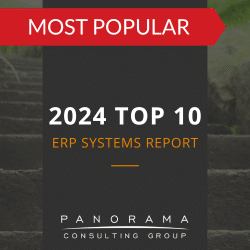As a CFO, you likely already know that robotic process automation (RPA) can improve the efficiency of financial operations. However, as the role of robotic process automation in finance continues to evolve, it’s important to stay up to date.
Today, we’re looking at the benefits that RPA is providing today so you can start thinking about how you can jump on this train, too.
How RPA Has Shaped the Finance Realm
In the finance space, robotic process automation has become part of a movement known as “hyperautomation.” With this shift, RPA doesn’t simply replicate human action. It also uses the data it captures to optimize end-to-end processes, making them more efficient. (Many of the top ERP systems have embedded RPA that can assist in this effort.)
The 2024 Top 10 ERP Systems Report
What vendors are considering for your ERP implementation? This list is a helpful starting point.
Combining RPA, ML, and AI
Many finance teams are combining the power of RPA with machine learning (ML) to unlock even more value from this technology.
Some are using RPA and artificial intelligence (AI) to expand the capabilities of their ERP, CRM, and SCM systems. In fact, there are more than a few use cases for AI in accounting.
Together, these tools can manipulate data and communicate across systems in ways that once required human input. Following are some of the benefits:
- Ensures bots can keep working, even if any data rules change
- Allows bots to analyze data and predict outcomes to enable more informed decision-making
- Uncovers patterns in data, extracting the most relevant insights for stakeholders
Overall, this allows teams to do more with their business intelligence.
For instance, bots can organize and consolidate data on customer payments, and then, ML can predict which accounts will pay on time. With this knowledge, companies can make strategic moves to save money and conserve relationships.
Robotic Process Automation in Finance: Key Use Cases
As more finance teams adopt RPA, we expect its applications to expand. Here are some of the ways it’s currently used.
1. Data Processing
Finance teams are responsible for handling a large amount of data, especially on purchase orders and invoices. With RPA, they don’t have to manually handle the repetitive tasks associated with each process.
On the invoice processing side, RPA can help companies create and send documents in each client’s requested format. This can save time and can even strengthen client relationships.
2. Financial Planning & Analysis (FP&A)
RPA can be used to automate many of the tasks involved in FP&A.
For example, companies can automate the process of financial forecasting by collecting data from a variety of sources, such as historical financial statements and economic indicators.
Throughout this process, companies can also use RPA to transform and cleanse data into a format that is more useful for analysis.
When this process is complete, RPA has yet another use case: generating reports that summarize the results of financial projections for various stakeholders.
3. Compliance
RPA can be used to automate tasks related to compliance, such as screening transactions for fraud or reviewing document processing activities for compliance risks.
When it comes to fraud, the bots can quickly identify and flag anomalies. It would be difficult for a human worker to spot these inconsistencies due to the sheer volume of transactions.
When it comes to document processing, RPA bots can be programmed to log all of their activities, such as the documents they processed, the data they extracted, and the people they interacted with. They can then generate reports that summarize these activities so finance teams can identify potential compliance risks.
Can Your Finance Team Benefit From RPA?
The role of automation in finance has evolved over the years. While robotic process automation has been around for decades, it was mostly used by large enterprises to automate simple, rule-based tasks.
As this technology has evolved, it has become more powerful and versatile. RPA is now being used by businesses of all sizes to automate a range of tasks across departments, including finance.
By implementing this technology, as well as related technologies, like generative AI, today’s CFOs are able to improve efficiency and reduce costs, while making more data-driven decisions.
If you’re a CFO wondering how your organization might benefit from using robotic process automation in finance, contact our enterprise software consultants below.














